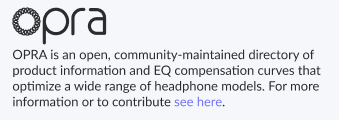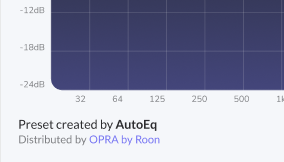OPRA is an open, community-maintained directory of product information and EQ compensation curves that optimize a wide range of headphone models. Our mission is to simplify and reduce the effort required to unlock the full potential of your headphones regardless of your level of experience, which software you choose to use, or the price point of your gear.
Headphone EQ information is spread across the internet in forums, subreddits, and Discord channels. It is all out there, but not very accessible. At the same time, there are pricey commercial headphone correction products, but they only work in certain software and with certain headphones. We believe that the community is doing a better job measuring headphones and developing EQ curves, but their work is fragmented, not easily accessed in player software, and difficult for people to use.
We have seen how efforts like Wikipedia, MusicBrainz, and the Open Source Seed Initiative successfully disrupt commercial spaces with open products, and we see an opportunity to do the same.
OPRA collects, organizes, and distributes this information in a way that makes it easy for the software you are already using to benefit from the work that headphone communities are already doing. This open dataset is intended to be a resource that anyone can use, whether for personal projects, open-source applications, or commercial applications, with minimal restrictions.
The OPRA project started at Roon Labs, the makers of Roon and Roon Labs continues to contribute by maintaining the repository, producing vendor and product artwork, and assisting with data ingestion and cleanup.
Follow our file and directory structure, and submit a PR with your changes.
See CONTRIBUTING.md for more detailed documentation.
The dataset is automatically generated after every commit to the repository. It is designed to be easily used by player software.
See CONSUMING.md for information about the dataset formats, and how to best consume the data.
The code in this repository is released under the MIT license.
Manufacturer, product, and EQ data is licensed under CC BY-SA 4.0, in a similar manner to Wikipedia. This license allows both commercial and non-commercial use and ensures that derivative works remain available to the community.
Attribution is required at two levels. If you are presenting a browser for the
OPRA database, please include the OPRA logo, as well as a brief description of what the
project is all about and a link to the repository. You can find OPRA logos in PNG format in the images/ folder.
For example:
When attributing presets, it is important to credit the preset creator as well as providing a link to the OPRA GitHub page. If possible, please make the preset creator attribution more visually prominent than the OPRA attribution.
For example:
Roon Labs is the team that makes Roon. For more information about Roon, see https://roon.app.
A lot of Roon users are also headphone enthusiasts, but getting headphone EQs into playback software is a manual process that involves combing internet forums and manually entering data into playback software. This is intimidating for people new to the hobby, and inefficient for the rest of us.
EQ curves are described in varying formats and terms, sometimes delivered via pdf, or simply in forum messages. Terminology is inconsistent, and information appears in varying levels of readiness for use. There is no one-size-fits-all solution for importing an EQ specification into a piece of software.
At the same time, we did not see it as our place to move into a new space and start claiming territory. We believe that something like OPRA should exist, and that it would be best for everyone if it is available to all, so while Roon will certainly integrate and contribute to OPRA, it's not our intent to control its destiny.
Roon has set up the repository, defined the git-based database format, built the documentation and tooling, and created a system that makes this data available to software that might make use of it. We have also contributed significant amounts of vendor and product artwork to ensure that products based on OPRA look great.
We will be approving PRs as the community builds out the repository, and as leaders emerge in the community, we will share this responsibility with others to ensure that this project is resilient in the long term.
Going forward, we will work to keep the data set clean and consistent so that when it is utilized within a product, the experience is great. We will use our graphic design team to maintain high quality product and manufacturer artwork, as we recognize that many people interested in contributing data may not be in a position to produce high quality graphics assets.
This repository is intended to aggregate the output of major creators of EQ curves from the headphones communities. We have kicked things off by ingesting and cleaning the data from the AutoEQ project, as it is already released under a permissive license.
Early collaborations are under development with likeminded leaders such as oratory1990 and we look forward to sharing updates soon.
We hope that over time other major creators of EQ compensation curves will choose to be a part of this effort, and we look forward to collaborating with the community to see where you want to take it next.
It is our hope that this dataset will be used by everyone--hobbyists, open source projects, and commercial products, and that it will become the canonical place where headphone models and EQ adjustments are cataloged and distributed.
As strong contributors and leaders emerge in the community, we will distribute merge permissions accordingly.


